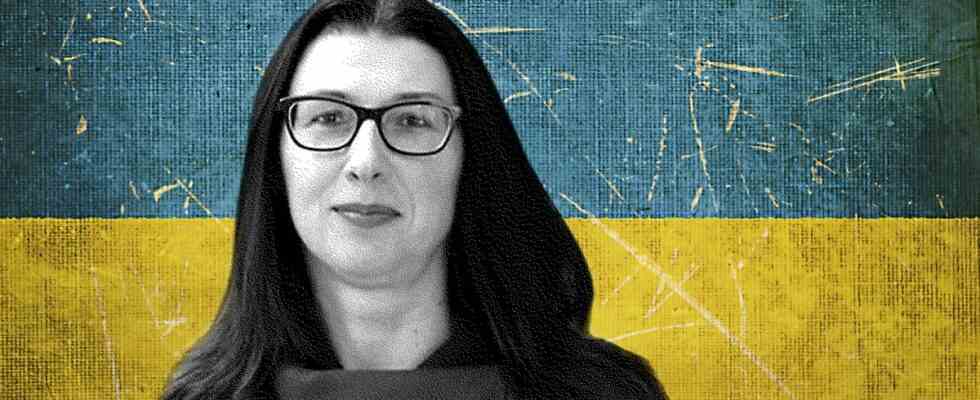Sometimes it seems to me that humanitarian work creates a certain dependency. You can’t live without it. Or at least I can’t live without it. Or it is a therapy substitute. Otherwise all the stories I hear and read – from the front, from the liberated areas, directly from refugees – would crush, decompose, psychologically destroy me. The Tsar’s slaves came to enslave Ukraine. The slaves are the worst when they suddenly have weapons in their hands that give them a sense of power. The inferior “I decide nothing” suddenly becomes “I decide about life and death”. I didn’t experience the war, the brutality and the destructiveness of the “Nation of Tolstoy and Dostoyevsky” myself. I was spared having to wait in the basement for days and weeks.
I wonder how people who have been tortured, maimed, humiliated, lost family and friends and survived will continue to live with their trauma. Maybe the dead are even luckier. And us, I’m left with the guilt. It is temporarily replaced by the pragmatic realization that it is good if the whole nation is not traumatized in the same way. My actions are compensatory behaviors.
The roof is finished, but no one knows when the craftsmen will be paid
Luckily there is the other side of the war. Solidarity, helpfulness, self-sacrifice. Little stories that inspire. Like the completed roof renovation in the village of Bila, which was made possible thanks to donations to the Institute for German Culture and History of Southeastern Europe. The place has belonged to the municipality of Mamayivtsi since the municipal reform. The former culture house will be converted into accommodation for refugees, ten rooms will be available. The inspection of the new roof is planned for Thursday morning, the renovation went quickly, the only thing that remains unclear is when the craftsmen will get their money for it. We were able to finance the material, but the community has to pay the wages. Some of the funds from all state and municipal institutions have been blocked for a long time, and the funds are primarily used for defense purposes.
However, the entrepreneur and the craftsmen know all this and are willing to wait, hopefully the money will be released by the end of the year, says community leader N., who is traveling to the village just a few kilometers from the outskirts. When we get out of the car in front of the building, the air alarm sounds. Nobody reacts, not even three older women who are standing at the Postmobile. The Postmobile belongs to the Ukrainian Post Office, which is responsible, among other things, for paying out pensions to people in rural areas. Many people can’t do anything with a bank account, and in some small villages there are no bank branches. The new roof needs a little celebration. There is a small but finely laid table in the room, which currently serves as the village chief’s office, but is to be vacated later. You have to toast to the fact that the roof stays tight, there’s cognac for that. A little after ten in the morning it’s still early and I still have four hours of classes in the afternoon, but the crowd is harmless. I’m handed a basket of flowers, the community leader says thank you profusely, I almost feel embarrassed because it’s anything but my personal merit.
There is some potential for conflict over the position of the Orthodox Church
We sit at the table for a while, a lot is said about life in the congregation, I admire N., a woman in her mid-fifties. Your community is one of the largest and most prosperous in the region. A lot has been done for the internally displaced people since the beginning of the war. The “Shelter of Saint Olha” was opened in a former company hotel with the support of ELEOS Ukraine, together with the Bukowina – Schwaben eV relief organization the “Dreams of special children” center for children with disabilities is expanded. Lots of small businesses, lots of initiative, some potential for conflict because of the position of the Orthodox Church, which is subordinate to the Moscow Patriarchate. As in other places, arguments with the pastors happen when fallen soldiers are buried. “The money that is donated to this church is practically an investment in the Russian missiles that are coming at us.” However, there remain many who continue to attend this church. As the main manager, N. must be able to deal with all of them. And refugees from Kyiv and Zaporizhia are reporting again, who returned after a stay here and are now considering returning to the safer region. I listen intently to their stories, there is not the slightest hint of arrogance or self-adulation in their demeanor.
For me it is an insight into the new worlds and realities of life. This is one of the reasons why I liked my management work better than the somewhat aloof and often unrealistic academic field. After the meal there is one more item on the agenda: a tour of another building in the neighboring town of Strilezkyj Kut, which could theoretically also be converted into accommodation for internally displaced persons. But putting theory into practice in this case is much more difficult: the house is bigger and requires a lot more investment. I can’t promise anything, just saying, “We recognize that the need exists.”
Read more episodes of this column here.

